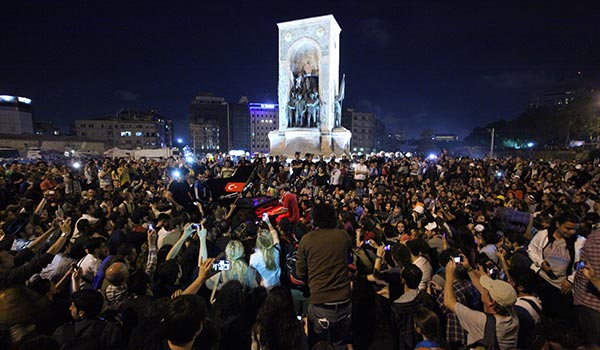
Photolure
What is happening in Turkey today is likely to be its prime minister’s worst nightmare and in view of these recent events Armenia will have to be prepared for serious developments in the neighboring country with which it does not have diplomatic relations, but has a bundle of unresolved issues instead.
The recent unrest in Istanbul and other Turkish cities may have also jeopardized Prime Minister Recep Tayyip Erdogan’s plan for the withdrawal of Kurdish militants from Turkey, increasing the likelihood of Kurds’ joining anti-government protests.
Members of the pro-Kurdish Peace and Democracy Party (BDP) held a peaceful march on June 29 in Istanbul to protest against the killing of a demonstrator by security forces in the southeastern Turkish province of Diyarbakir. Protesters were holding photographs of 18-year-old Medeni Yildirim, the man who was killed in the incident. Participants in the demonstration chanted: “Erdogan, do not make us go to the mountains!”
On June 30, the BDP presented a list of demands to the Government of Turkey as part of the ‘second phase’ of the process of Turkish-Kurdish conflict settlement. In a statement the BDP demanded, among other things, the abolition of ‘rural guards’ in the south-eastern regions, where local residents are armed by the state to fight the Kurdistan Workers’ Party (PKK). But the main demand of the BDP is for the release of PKK leader Abdullah Ocalan, who is currently serving a life sentence in a Turkish jail.
Protests in Turkey, which began in late May with the protection of Gezi Park in Istanbul, resulted in anti-government demonstrations throughout the country. During the past week they subsided a little, but Kurdish leaders took advantage of the situation by putting forward their demands to Prime Minister Erdogan.
Erdogan’s government is now going through difficult times. The government suffers obvious failures in its foreign and domestic policies. The policy of ‘zero problems with neighbors’, in fact, resulted in deteriorated relations with all of the neighbors. In particular, Turkey has become the number one enemy of Syria. Now that there is a greater likelihood of Syria’s incumbent president Bashar al-Assad’s staying in office until the next election, as well as of relations improving between the West and Iran, Turkey starts to look more like a diplomatic pariah.
Turkey’s relations with the European Union are not being successful either. Turkish Minister for EU Affairs Egemen Bagis said on Sunday that Turkish membership in the EU was delayed “for political reasons.” He added that some circles in Europe are concerned about Turkey’s membership, as this country is one of the strongest and biggest countries in the continent. In fact, the EU simply does not want Turkey to become its member because it regards it as a country with an alien culture.
Turkey continues to have no relations with its eastern neighbor Armenia, and in a couple of years it may become a fatal circumstance for Ankara. Turkey has been linking normalization of relations with Armenia with progress in the Karabakh conflict that would favor its regional ally and ethnic cousin Azerbaijan, thus triggering a rejection of both Armenia and Western countries. The closer it is to 2015, when Armenians around the world will mark the 100th anniversary of the Ottoman-era Genocide, the more likely it becomes that Armenia will put forward material, including territorial, claims to Turkey.
Unless Erdogan releases Ocalan, the Kurdish movement can engulf the entire country, and together with claims from deported indigenous peoples like Armenians, Greeks and Assyrians it could gravely endanger the territorial integrity of the country. So, Erodgan’s plans to rebuild the Ottoman Empire may, in fact, spell the end of what is modern-day Turkey.
Armenia is now quietly watching the developments in Turkey. It is now difficult to predict what the developments in Turkey will lead to and what impact they will have on neighboring Armenia. But it is obvious that Yerevan will have to stay alert and be prepared for any developments in the neighboring country with which it has had a troubled past, un-neighborly present and uncertain future.
Naira Hayrumyan, 1 July 2013
Source: http://armenianow.com/commentary/analysis/47323/turkey_unrest_gezi_taksim_square_europe



